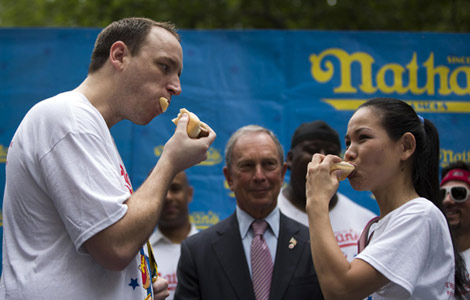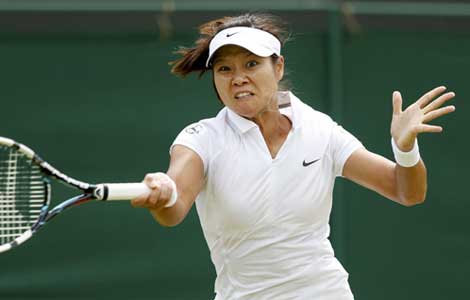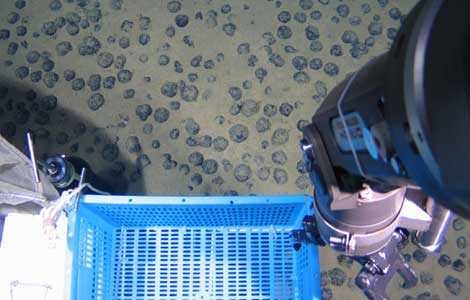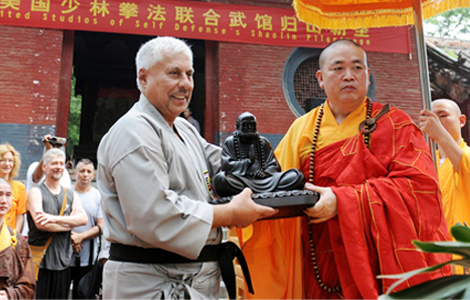Japan gears up for crucial parliamentary polls
Updated: 2013-07-05 15:33
(www.asianewsnet.net/The Yomiuri Shimbun)
|
||||||||
The 17-day campaign period for the House of Councillors election, set for July 21, officially started Thursday, with the Abenomics economic policies of Prime Minister Shinzo Abe’s administration seen as the most contentious issue.
Other major issues in the election, the first full-scale national election since the launch of the second Abe administration in December, include constitutional revision and restarting idle nuclear power reactors.
For the 23rd upper house election, 433 people filed candidacies: 271 in constituencies and 162 in the proportional representation system. In the previous upper house election in 2010, 437 candidates ran, with 251 in constituencies and 168 in the proportional representation system.
A major focus of the election is whether the Liberal Democratic Party and New Komeito can secure the 122 upper house seats--including those not up for grabs--needed for a majority, and end the divided Diet.
Out of 242 upper house seats, 121 seats are now up for grabs, with vote counting to take place the same day as the election.
With the official announcement of the election, party leaders took to the streets to deliver speeches nationwide.
Abe, who is also president of the LDP, kicked off his campaign in Fukushima city, promoting the positive effects of Abenomics.
“I launched the policy of ‘three arrows,’ which are extraordinarily different [from conventional economic policy measures], to overcome deflation. The real economy is improving. We’ll make it keep growing with our strong will,” Abe said.
Democratic Party of Japan President Banri Kaieda made his first campaign trail speech in Morioka on the day, taking the opportunity to slam Abe’s economic policies.
“Did your daily living improve [thanks to Abenomics]? The answer is ‘no.’ We have to fight the Abe administration, which is destroying people’s daily lives,” Kaieda told voters.
Half of the upper house quota of 242 seats are up for election every three years. This time 73 seats in constituencies and 48 seats in the proportional representation portion are being contested.
The revised Public Offices Election Law, devised to correct a gap in the value of votes in both Diet houses, has been enacted. As a result, the quota was increased from three to four in Kanagawa and Osaka prefectures, while those for Fukushima and Gifu prefectures were reduced from two to one.
The LDP and Komeito together hold 59 seats that are not up for election this time. The two parties need to win 63 seats or more to secure a majority.
If the divided Diet situation is resolved, it would consolidate the Abe administration’s political foundation, which could enhance both parties’ efforts to pursue their policy points.
Another major focus is whether parties in favor of revising the Constitution will be able to secure a two-thirds majority of 162 seats in the upper house.
Of the upper house seats not contested this time, there are 63 seats belonging to those who are positive about constitutional revision. They belong to the LDP, Nippon Ishin no Kai (Japan Restoration Party), Your Party, New Renaissance Party and an independent. As the New Renaissance Party is not fielding a candidate in this election, the other three parties would need to secure a combined total of 99 seats to reach 162.

 Joey Chestnut wins 7th contest with 69 dogs
Joey Chestnut wins 7th contest with 69 dogs
 Lisicki, Bartoli to vie for new Wimbledon crown
Lisicki, Bartoli to vie for new Wimbledon crown
 Muscle Beach Independence Day
Muscle Beach Independence Day
 Tough workout for Li Na in war of words
Tough workout for Li Na in war of words
 Submersible taps mineral deposits in S China Sea
Submersible taps mineral deposits in S China Sea
 Ecuador finds spy mic for Assange meeting
Ecuador finds spy mic for Assange meeting
 US martial artists arrive at Shaolin Temple
US martial artists arrive at Shaolin Temple
 July 4 in Prescott: Balance of grief, patriotism
July 4 in Prescott: Balance of grief, patriotism
Most Viewed
Editor's Picks

|

|

|

|

|

|
Today's Top News
Gunman shoots two, commits suicide in Texas
Baby formula probe to shake or reshape industry?
Passenger detained over bomb hoax in NE China
High rent to bite foreign firms in China
Egypt's prosecution imposes travel ban on Morsi
Russia more impatient over Snowden's stay
Mandela still 'critical but stable'
Figures show shifts in US, China economies
US Weekly

|

|







